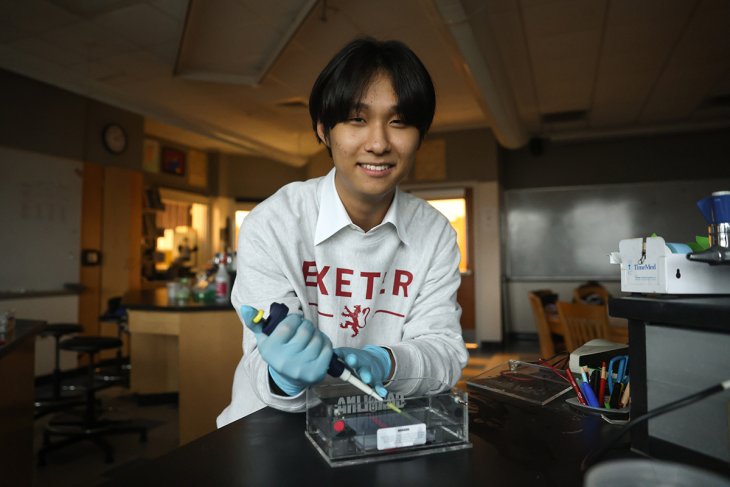Aden Lee

"I feel like there's this idea that high school students can't think of novel things or conduct amazing research [and] I wanted to build this framework as a way for people to actually do that research."
On Sunday afternoons, Aden Lee ’24 heads to the Forum in the Elizabeth Phillips Academy Center, where he works for an hour or so with a group of fellow students interested in bioinformatics, the dynamic interdisciplinary field that melds biological data with computer science.
As a co-head of Exeter’s Biology Club, Lee founded a sub-group of the club devoted to bioinformatics after his lower year at Exeter, when he researched and published an article in the International Journal of High School Research on gene expression in the brains of patients with COVID-19, Alzheimer’s disease and vascular dementia. Knowing the challenges involved with trying to get regular access to a wet lab outside of science class, Lee wanted to help other students discover how to do high-quality scientific research with little more than a computer, a software program or two —and their own curiosity.
“I feel like there's this idea that high school students can't think of novel things or conduct amazing research,” Lee says. “I wanted to build this framework as a way for people to actually do that research or answer questions they had on diseases as well.”
Now a four-year senior, Lee has taken full advantage of Exeter’s robust biology curriculum. As an upper, he took both Introductory Genetics and a newly developed course in which students succeeded in mapping a full genome sequence for a strain of the malaria-carrying mosquito species Anopheles gambiae. Taught by Dr. Shimaa Ghazal, the course builds on the model of Exeter’s popular “fruit fly course,” and will return in spring 2024 as Exploring Bioinformatics and Next-Generation Sequencing.
Alongside his coursework, Lee has built an impressive body of independent research that is gaining international notice. In April 2023, he won first place at the 61st National Junior Science and Humanities Symposium, the premier showcase for STEM research by high school students. “My project was on microplastics and how they can infiltrate your body, your brain tissue, and cause neuroinflammation, especially in the brain,” Lee explains.
Titled “Polystyrene Microplastics Exacerbate Neuroinflammation in Obese Condition,” Lee’s report captured the top national ranking in the Biomedical Sciences category of the competition, along with $14,000 in scholarship funds. He also qualified for the International Science and Engineering Fair, in which he entered a project on the effect of glucose metabolism in people with attention-deficit/hyperactivity disorder (ADHD).

Lee is currently preparing to enter the Regeneron Science Talent Search, the nation’s oldest and most prestigious high school science competition. Past champions include 13 Nobel Prize winners — and Exeter’s own Yunseo Choi '21, who captured the top prize of $250,000 in 2021.
Through the Biology Club and the subgroup Lee started, he is helping younger students seeking to enter science competitions like the ones where he has found success. “Aden is just someone who's so excited about biology and being able to share that passion with others, whether it's through his competitions [or] through research talks,” says Science Instructor Summer Morrill ’11, who taught Aden in the introductory genetics class and advises his Biology Club bioinformatics sub-group in an informal capacity. “I think he just gets a lot of joy out of being able to share that, and he's helped other students very tangibly in that way.”
A former ISEF judge, Morrill is gratified to see Lee and a growing number of other Exeter students entering similar competitions. “Being able to practice giving a scientific talk, communicating clearly and thoroughly about a very complex subject, is something that most folks don't even get to learn until upper levels of undergraduate, if not graduate school,” she says. “I think that if you are someone who loves to ask questions, these competitions are the right place for you, because it's not necessarily about the volume of work or whether or not your experiment succeeds. It’s about that curiosity, and the dedication to seeking an answer.”
